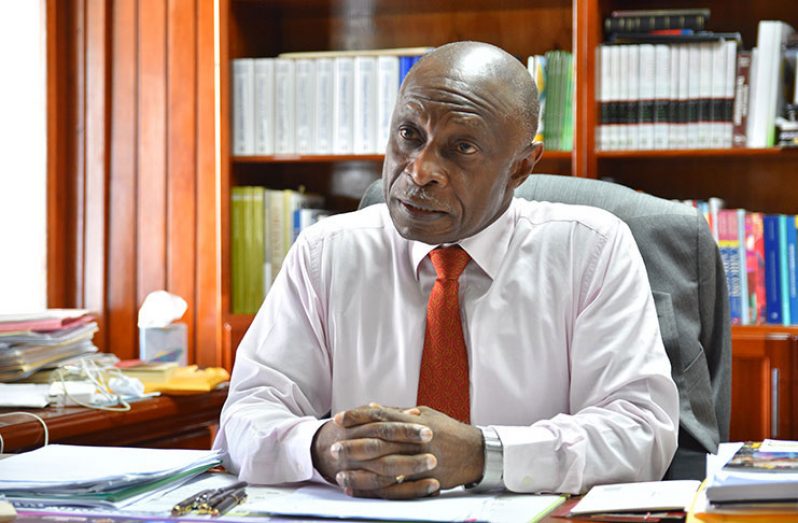…Guyana says Venezuela’s non-jurisdictional claims baseless
THE Government of Guyana, in its submission to the International Court of Justice (ICJ) on the Guyana/Venezuela Controversy, argued that Venezuela’s contention that the means of settlement outlined in Article 33 of the UN Charter must be exhausted before recourse to the court can be chosen is baseless.
As scheduled, on November 19, 2018, the Government of Guyana submitted to the ICJ its Memorial on Jurisdiction in the case brought against Venezuela to confirm, in a final and binding judgment, the full legal validity of the arbitral award that established the international boundary between Guyana and Venezuela more than a century ago. Minister of Foreign Affairs, Carl Greenidge made the disclosure on Monday in the National Assembly.
“Guyana’s Memorial shows there is no foundation to Venezuela’s contention that the means of settlement listed in Article 33 of the UN Charter must be selected by the Secretary-General successively, such that the means listed ahead of judicial settlement have to be exhausted before recourse to the ourt can be chosen,” the Minister of Foreign Affairs said.
He maintained that nothing in the text of Article IV of the Geneva Agreement, which provides a menu of options, supports Venezuela’s interpretation. The minister added: “Nor is Venezuela correct in arguing that, as it has recently asserted, the controversy must be resolved exclusively by friendly negotiations, a claim that is belied by the express terms of the Geneva Agreement and contemporaneous statements by the parties during its negotiation and ratification.”
Guyana filed its memorial in accordance with the Order of the Court dated June 19, 2018 that determined it would first resolve the question of the court’s jurisdiction in light of Venezuela’s refusal to participate in the proceedings based on its claim that the court lacks jurisdiction.
Greenidge noted that Guyana prepared its memorial with the court’s instruction in mind that it should be informed of all the legal and factual grounds on which the parties rely in the matter of its jurisdiction.
“Guyana’s submission accordingly sets out how the boundary with Venezuela was established by an arbitral tribunal constituted pursuant to a treaty concluded by Venezuela and Great Britain in 1897,” Minister Greenidge explained.
Pointing to the facts of the matter, the minister of Foreign Affairs said Venezuela accepted the unanimous award rendered by five eminent jurists on October 3, 1899. The Spanish-speaking country had also participated in a joint commission to demarcate the boundary on the ground, and insisted on the award’s strict implementation.
“Only decades later did Venezuela, in anticipation of Guyana’s independence, cease recognising the award’s validity and binding nature, using that pretext to lay claim to more than two-thirds of Guyana’s territory,” the Minister of Foreign Affairs noted.
In an effort to ensure a final resolution to the controversy through peaceful means, the Government of British Guiana, Venezuela and the United Kingdom concluded the Geneva Agreement on February 17, 1966. Article IV of that treaty authorises the Secretary-General of the United Nations to decide which of the means listed in Article 33 of the United Nations Charter shall be used to resolve the controversy. Notably, it includes binding adjudication by the ICJ. In agreeing to Article IV, Venezuela consented to the court’s jurisdiction in the event the Secretary-General decides that the controversy should be resolved by the court, the Ministry of Foreign Affairs said.
“Efforts over more than half-a-century, including a four-year Mixed Commission (1966-1970), a twelve-year moratorium (1970-1982), a seven-year process of consultations on a means of settlement (1983-1990), and a twenty-seven-year Good Offices Process under the UN Secretary-General’s authority (1990-2017), all failed to end the controversy. On 30 January 2018, United Nations Secretary-General António Guterres, acting under the authority bestowed upon him by the Geneva Agreement, chose adjudication by the court as the means for resolving the controversy with finality,” the minister further outlined.
It recalled that Guyana commenced proceedings before the ICJ on March 29, 2018 in accordance with the secretary-general’s decision.
“Guyana has no doubt that the court has jurisdiction to resolve the controversy that has plagued its relations with Venezuela and undermined its ability to develop its sovereign territory and natural resources,” the Minister of Foreign Affairs said.
Guyana remains hopeful that Venezuela will reconsider its refusal to participate in the judicial process that the UN Secretary-General has decided will be the means by which the controversy will be resolved.
Guyana’s representation before the court is led by Greenidge; and by its co-agents, Sir. Shridath Ramphal and Ambassador Audrey Waddell.
Just days ago, the US called on both Guyana and Venezuela to respect the 1899 Arbitral Award, thereby shifting its position on the issue. Originally, the US had called for a timely resolution to the controversy. The Caribbean Community (CARICOM) has also thrown its support behind Guyana, acknowledging its effort to resolve the age-old controversy.




.png)









